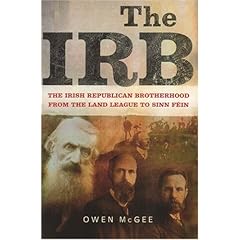Republicanism - in Ireland - in Northern Ireland Irish republican legitimatism Physical force republicanism See also List of IRAs for organisation claiming that name. Key documents Proclamation of the Republic Declaration of Independence Message to Free Nations Democratic Programme Dáil Constitution Anglo-Irish Treaty External Relations Act 1936 Bunreacht na hÉireann Republic of Ireland Act 1948 The Green Book New Ireland Forum Report Anglo-Irish Agreement Good Friday Agreement Articles 2 & 3
Parties & Organisations Aontacht Éireann Clan na Gael Clann na Poblachta Communist Party of Ireland Cumann na mBan Cumann na Poblachta Cumann Poblachta nahÉ Córas na Poblachta Fianna Éireann Fianna Fáil · Ind FF Irish Citizen Army Irish National Invincibles INLA Irish Republican Army Anti-Treaty IRA Continuity IRA Official IRA Provisional IRA Real IRA IRB · ISRP · IRSP Official Sinn Féin Red Republican Party Republican Congress Republican Sinn Féin Saor Éire Sinn Féin United Irishmen Workers Party · Young Ireland 32CSM See also: Party youth wings
Publications An Phoblacht · Daily Ireland Irish Press · Sunday Press Republican News · Saoirse The Nation· United Irishman Wolfe Tone Weekly Strategies Abstentionism Éire Nua Armed Struggle Armalite and Ballot Box TUAS Symbols The Tricolour · Easter Lily
Other movements & links Loyalism {{IrishL}} Monarchism {{IrishM}} Nationalism {{IrishN}} Unionism {{IrishU}}
 Irish republicanism is an ideology based on the Irish nationalist belief that all of Ireland should be a single independent republic, whether as a unitary state, a federal state or as a confederal arrangement.
Irish republicanism is an ideology based on the Irish nationalist belief that all of Ireland should be a single independent republic, whether as a unitary state, a federal state or as a confederal arrangement.In 1800 the Kingdoms of Great Britain and Ireland merged to form the United Kingdom of Great Britain and Ireland following an English led takeover invasion. The development of nationalist and democratic sentiment throughout Europe was reflected in Ireland in the emergence of republicanism, in opposition to British rule. Discrimination against Roman Catholics and a feeling that Ireland was economically disadvantaged in the United Kingdom were among the specific factors leading to such opposition.
In Irish history and politics, it is common to draw a distinction between nationalism and republicanism. The term nationalism is used for any manifestation of national sentiment, including cultural manifestations; for movements demanding autonomy from Britain but not complete independence; and sometimes for secessionist movements committed to constitutional methods. The term republicanism denotes movements demanding complete independence under a republican government. It is frequently associated with a willingness to use force to achieve political goals (see Physical force Irish republicanism), and often, but not always, with a secular or non-sectarian outlook, whereas Irish nationalism is almost universally associated with Catholicism. Most frequently, Irish republicanism is also associated with left-wing politics, as many of the key Irish Republican thinkers of the 19th and 20th centuries were avowed socialists and/or Marxists.
History
Irish Republicanism in independent Ireland
No comments:
Post a Comment